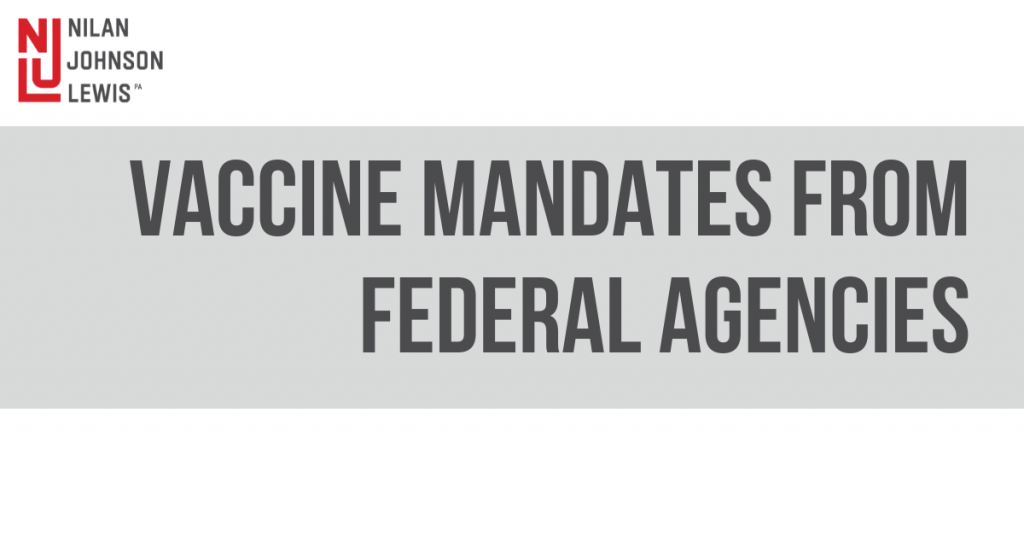
Posted December 1st, 2021 in Top Stories, Legal Insights with Tags Labor and Employment, Employment law, COVID-19, COVID-19 for Employers
Stay Issued for Federal Vaccine Mandates
Originally published 11/08/21. Updated 12/01/21.
As expected, the OSHA Emergency Temporary Standard (ETS) faced immediate legal challenge, and on Saturday, the Fifth Circuit Court of Appeals issued a stay blocking the law from going into effect. Below, we outline the key requirements and dates of the OSHA ETS, which requires employers with 100 or more employees to enforce a vaccine-or-test policy.
The Fifth Circuit cited “grave statutory and constitutional issues” with the ETS and temporarily issued a stay while the parties brief arguments on a permanent injunction. The ruling certainly impacts the Fifth Circuit (Texas, Louisiana, and Mississippi), but the Court does not address whether the stay has a nationwide impact. This may be clarified soon as the case moves forward on a tight deadline. At any rate, legal challenges are pending in several other Circuits, and so the likelihood of the OSHA ETS going into effect in any Circuit is becoming increasingly unlikely.
Even as it becomes less likely the OSHA ETS will go into effect, employers should still take some steps to plan for implementation so they are not caught completely off guard by unexpected litigation developments. For instance, employers should update data on the vaccination rate among employees, to help inform decisions about whether to offer testing generally or only as a reasonable accommodation, and to begin working on a policy document to be effective December 5, 2021, unless the ETS remains blocked.
Background on OSHA’s Emergency Temporary Standard Vaccine and Testing Mandate
The ETS vaccine mandate rule requires covered businesses with 100 or more employees companywide to mandate that employees receive the COVID-19 vaccination, or wear a mask and test for COVID-19 once a week. Effective December 5, 2021, all covered employers must ensure all unvaccinated workers begin wearing masks, and beginning January 4, 2022, all unvaccinated employees must provide a negative COVID-19 test on a weekly basis.
Important Points:
1. Covered employers must develop, implement, and enforce a written mandatory COVID-19 vaccination policy beginning December 5, 2021.
2. As the goal of the ETS is to encourage employees to get vaccinated, the ETS requires that employers provide employees with up to four hours of paid time off to get vaccinated if employees choose to do so during work hours (if necessary).
3. The ETS does not require employees working remotely, from home, or exclusively outdoors to be vaccinated.
4. Employers are required to provide reasonable accommodations for medical or religious exemptions, but accommodations need not be provided if they would cause undue hardship to the business.
5. The ETS does not itself require employers to pay for the cost of weekly testing. However, where an employee qualifies for an exemption under the ADA or Title VII, employers may be required to cover the cost of testing as a reasonable accommodation. Employers should also be aware that requiring employees to pay for their own testing may violate state law and/or FLSA minimum wage laws.
6. Acceptable COVID-19 tests are tests that are approved or authorized, including Emergency Use Authorization (EUA) by the U.S. Food and Drug Administration (FDA), to detect current infection with the virus. The test must be administered in accordance with the authorized instructions.
6.1. Acceptable Test Examples:
6.1.1. Tests administered by a laboratory;
6.1.2. Conducted in a doctor’s office or urgent care facility; or
6.1.3. Self-administered tests that are conducted or observed by an employer or telehealth proctor.
7. Employers must immediately remove employees who test positive for COVID-19 from the workplace. ETS does not require employers to provide paid time for the removal.
8. Fully vaccinated means a person’s status two weeks after completing primary vaccination with either two doses of Pfizer or Moderna or one dose of Johnson & Johnson – by January 4, 2022.
9. Proof of vaccine must be maintained as an employee medical record (29 C.F.R. 19.10.1020) while the ETS is in effect.
CMS Emergency Regulation Requiring COVID-19 Vaccination for Health Care Staff
An emergency regulation issued on November 4th by the Centers for Medicare & Medicaid Services (CMS) will require certain Medicare and Medicaid certified providers (see list below) to establish a policy ensuring all eligible staff receive the first dose or one-dose of a COVID-19 vaccine prior to providing any care treatment or other services by December 5, 2021. All eligible staff must have received the necessary shots to be fully vaccinated – either two doses of Pfizer or Moderna or one dose of Johnson & Johnson – by January 4, 2022. CMS specifically declined to allow daily or weekly testing as a substitute for vaccination. However, the emergency regulation allows for exemptions based on recognized medical conditions or religious beliefs. CMS stated its intention to continue to review the scientific evidence and stakeholder feedback on this issue during the comment period to the Interim Final Rule. These CMS requirements are on top of requirements also being issued by OSHA that apply to large (100+) employers; these CMS requirements will apply even if a court halts implementation of the OSHA rules.
*** On November 29, 2021, a preliminary injunction was granted to prohibit implementation of the Interim Final Rule in ten states. The following day, on November 30, 2021, a preliminary injunction by the U.S. District Court for the Western District of Louisiana blocked CMS from implementing the CMS vaccine mandate nationwide.
Only the following Medicare and Medicaid certified providers and suppliers are subject to the CMS Interim Final Rule:
- Ambulatory Surgical Centers (ASCs) (§ 416.51)
- Hospices (§ 418.60)
- Psychiatric residential treatment facilities (PRTFs) (§ 441.151)
- Programs of All-Inclusive Care for the Elderly (PACE) (§ 460.74)
- Hospitals (acute care hospitals, psychiatric hospitals, hospital swing beds, long term care hospitals, children’s hospitals, transplant centers, cancer hospitals, and rehabilitation hospitals/inpatient rehabilitation facilities) (§ 482.42)
- Long Term Care (LTC) Facilities, including Skilled Nursing Facilities (SNFs) and Nursing Facilities (NFs), generally referred to as nursing homes (§ 483.80)
- Intermediate Care Facilities for Individuals with Intellectual Disabilities (ICFs-IID) (§ 483.430)
- Home Health Agencies (HHAs) (§ 484.70)
- Comprehensive Outpatient Rehabilitation Facilities (CORFs) (§§ 485.58 and 485.70)
- Critical Access Hospitals (CAHs) (§ 485.640)
- Clinics, rehabilitation agencies, and public health agencies as providers of outpatient physical therapy and speech-language pathology services (§ 485.725)
- Community Mental Health Centers (CMHCs) (§ 485.904)
- Home Infusion Therapy (HIT) suppliers (§ 486.525)
- Rural Health Clinics (RHCs)/Federally Qualified Health Centers (FQHCs) (§ 491.8)
- End-Stage Renal Disease (ESRD) Facilities (§ 494.30)
Next to each provider type above in parentheses are the new vaccination requirements in the Conditions of Participation, Conditions for Coverage, or Requirements for Participation located in Title 42 of the Code of Federal Regulations (CFR). CMS will ensure compliance with these requirements through established survey and enforcement processes. If a provider or supplier does not meet the requirements, it will be cited by a surveyor as being non-compliant and offered an opportunity to return to compliance before additional actions occur.

